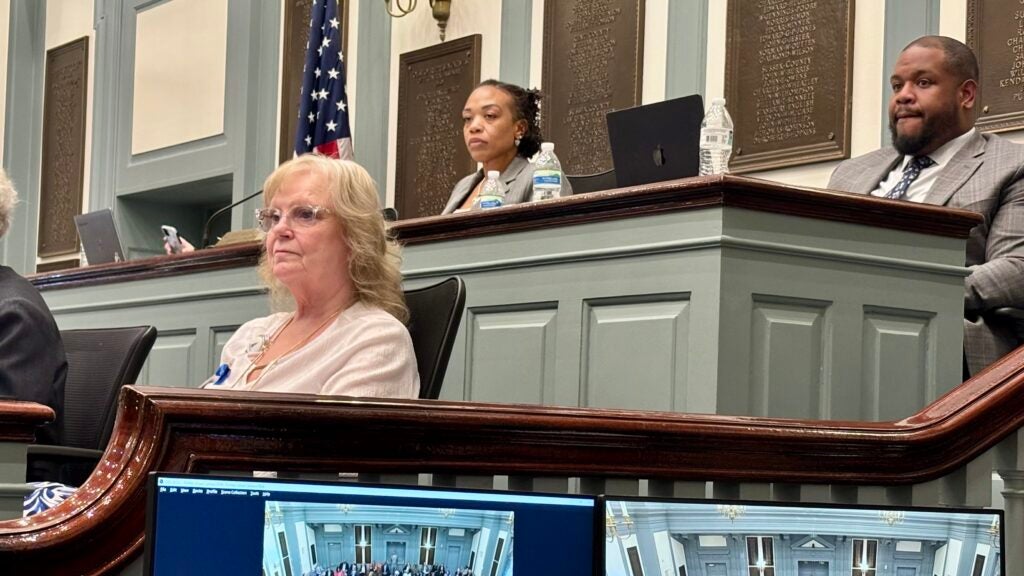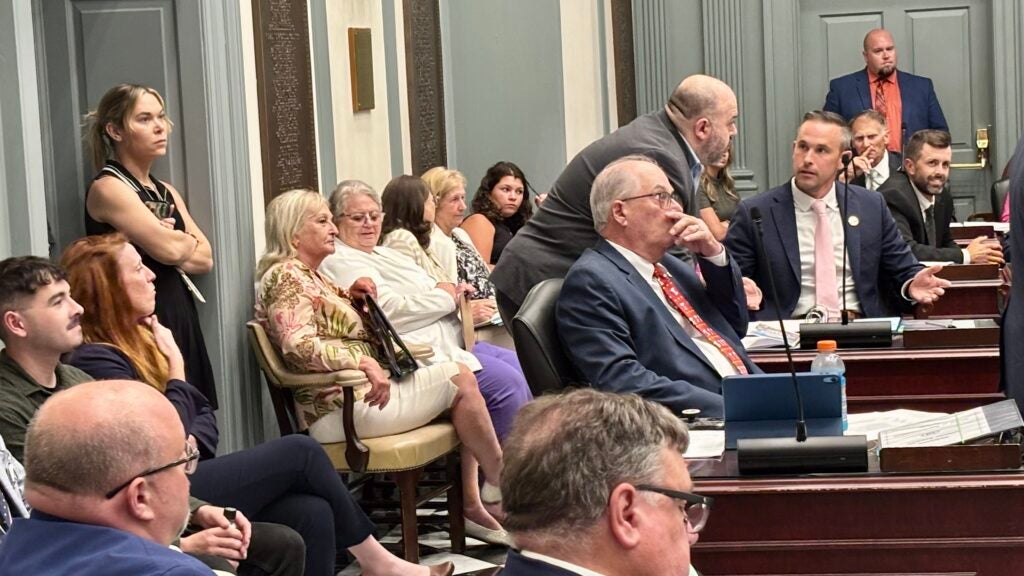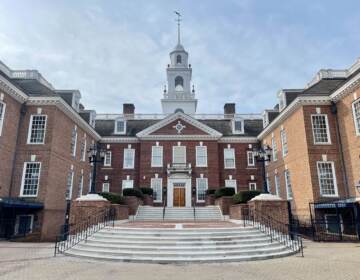‘Political theater’: Delaware lawmakers pass bills to help with massive residential property tax hike after fights and name-calling
The debate was sharpest in the state House, where members accused each other of grandstanding.
Listen 1:05
Newark Democrat Madinah Wilson-Anton defends her moves to get her legislation passed during a rare special session focused on relieving high property tax bills. (Sarah Mueller/WHYY)
What are journalists missing from the state of Delaware? What would you most like WHYY News to cover? Let us know.
Delaware lawmakers on Tuesday passed several bills in a rare special session designed to relieve pressure on residents facing high tax bills after property reassessments.
Homeowners throughout the state are facing increases of up to thousands of dollars in county and school taxes after property values were reassessed for the first time in decades.
The public outcry after New Castle County residents received their bill notices last month moved legislators to meet. Frustrated residents have taken to social media, attended city and county council meetings and contacted their state representatives to voice their anger over new valuations.
What got approved
Despite more than a dozen pieces of legislation filed by progressive members of their own party and by Republican lawmakers, House Democratic leadership considered just three bills.
- House Bill 242 would allow school districts to set different tax rates for residential and commercial properties
- House Bill 240 would allow residents who successfully appeal their property values to be eligible for direct cash refunds
- House Bill 241 would require that residents be offered a payment plan during the first tax year following a general reassessment if their tax bill increases by $300 or more
- Senate Bill 203 would codify that counties have the authority to set separate property tax rates for residential and non-residential properties
- Senate Bill 204 makes clear that all municipalities can set different rates for residential and non-residential properties without needing a charter change
- Senate Concurrent Resolution 122 calls for a statewide review of the reassessment process to make sure future reassessments are conducted fairly, transparently and equitably
- Senate Bill 202 would require New Castle County to submit data on property parcels enrolled in payment plans to members of the General Assembly, the governor and certain state agencies on a quarterly basis
‘Political theater’ and ‘grandstanding’
State Rep. Madinah Wilson-Anton (D), who sponsored most of the bills that failed to make the state House agenda, successfully attached much of the guts of her bills to those voted on on the House floor Tuesday.
House Speaker Melissa “Mimi” Minor-Brown (D) said that leadership limited bills under consideration to three for the special session because it was a short period of time to get fixes done quickly.
“We were all working collaboratively, so we just wanted to stick with what we knew,” she said. “And the thing is, those bills were vetted. We met with the stakeholders. The other bills, the sponsors hadn’t met with the stakeholders.”

Debate over the legislation almost immediately devolved into accusations by both parties of “political theater” and “grandstanding.” That included finger-pointing by Republicans and Democrats against their own party that lasted well into the night.
House Republicans complained about the lack of an open process. They were displeased about the suspension of rules that allowed lawmakers to vote on the legislation without the bills going through the committee process with public comment.
At one point, Republican state Rep. Mike Smith called for Gov. Matt Meyer to come to the House floor to answer questions about the property reassessment process in New Castle County as the county’s executive in the years prior to becoming governor in January.
“He’s the one that signed off on the [Request for Proposal] for Tyler Technologies,” he said. “I think it’s important if we’re going to be in a live session, if we’re going to take the time that he can face the time as well.”

Meyer did not appear in the House, nor did he take questions from reporters.
Minor-Brown said many people have questions about the property assessment process Tyler used in New Castle County.
“He may be able to answer some of the questions for folks that haven’t received the answers yet,” she said. “And he may know more about this topic than the current county executive, so I’d be happy to hear from him as well.”
The debate among members of the Democratic party in the House reflects the chasm that has widened between Wilson-Anton, her progressive colleagues and House leadership over at least the past several months.
State Rep. Claire Synder-Hall (D) seemingly accused Wilson-Anton of political grandstanding by referencing “some people” who held press conferences on their own, as Wilson-Anton did last week to highlight the bills she was sponsoring.
“I just find it unfortunate that it’s almost 7 o’clock and we haven’t yet been able to get to the bills, and part of that’s because some people in our caucus are not working with the rest of the people,” she said. “But instead dropping their own bills, calling their own press conferences and refusing to actually have a conversation with leadership.”
Wilson-Anton shot back, saying she held a press conference last week to share her legislation with the public after they were not included on Tuesday’s agenda.
“The idea behind a press conference, for those who are unfamiliar, is to share ideas with the public,” she said. “It’s an opportunity for the press to ask questions and for the press to share information with the public.
Now I would argue that that’s a good thing for democracy.”
Smoother action in the Senate
State senators made relatively quick work of the House measures as well as four of their own, including a concurrent resolution that called for an immediate review of the recent statewide property reassessment by the members of the General Assembly to make recommendations for future reassessments.
The House passed all of the Senate bills, and Meyer signed all of the legislation privately Tuesday night except Senate Bill 202. It’s unclear whether he will sign it.
“We still, together, have a lot of work to do, but today’s special session was a step in the right direction,” Meyer said in a statement issued early Wednesday morning.
Calls to audit Delaware’s property assessment process
Wilmington City Councilmember Christian Willauer and New Castle County Councilmembers David Tackett and Brandon Toole, all Democrats, have called for an audit of how Tyler Technologies, a third-party contractor, valued residential and nonresidential properties.
The company used two different methods for evaluating residential and nonresidential properties. It determined the values for residential properties based on sales comparison data and the physical inspection of buildings and land, which is a requirement set forth in the Delaware Constitution. Tyler used income information for commercial, utilities and industrial facilities.
Tyler officials recently told WHYY News the company has not received a request to participate in an audit. They defended the methodology for commercial properties, saying it used industry best practices, such as the sales comparison and income approaches, to ensure commercial land is valued fairly and consistently.
This story was supported by a statehouse coverage grant from the Corporation for Public Broadcasting.


Get daily updates from WHYY News!
WHYY is your source for fact-based, in-depth journalism and information. As a nonprofit organization, we rely on financial support from readers like you. Please give today.








